Threading aid into the chaos of war or collapse of social order is one of most dangerous, and crucial, challenges of our time. There are 65 million refugees in the world today – the most since World War II.
Fragile states such as Syria, Yemen, South Sudan and Afghanistan (farmland, pictured above) are notoriously vexing, yet aid organizations continue to support millions of the displaced, who are mostly women and children. In each case, America’s security interests hang in the balance. In each case, soft power matters.
Heads of some of America’s best-managed assistance organizations joined dozens of other influential leaders in academia, think tanks, business, government and international organizations at this year’s Brookings Blum Roundtable. Why? Among the vital reasons: “Those who love peace must be prepared to organize as effectively as those who love war,” as Dr. Martin Luther King Jr. said long ago.
Here are thoughts from seven participants on how best to shepherd aid to refugees within and beyond the borders of nations rent by deadly conflict or natural disaster.
Matt Trevithick, managing partner, SREO Consulting, an advisory based in Turkey that evaluates and monitors on the ground how effectively aid is delivered within targeted communities. He worked with aid projects in Afghanistan before co-founding the advisory in 2013.
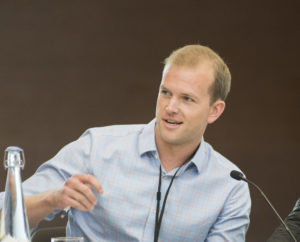 “Governments and large organizations are, of course, still very important, to effectively respond to displacement, but local governance and local actors are increasingly important in ways that we need to recognize.
“Governments and large organizations are, of course, still very important, to effectively respond to displacement, but local governance and local actors are increasingly important in ways that we need to recognize.
Many problems demand a local response because that’s where the policy can be most effective. And looking at the U.S. track record in fragile areas post 9/11, it’s clear that new and creative thinking is urgently needed on this front to facilitate more effective engagement.”
Neal Keny-Guyer, CEO, Mercy Corps; prior experience directing humanitarian relief and development aid in war-torn areas with Save the Children, CARE, and UNICEF. Among several other relief programs, including hurricane response in Puerto Rico and Texas, Mercy Corps helps support 650,000 Syrian refugees in Jordan and a million Syrian refugees in Lebanon. Afghan farmers who work the fields in the photo above are supported by Mercy Corps.
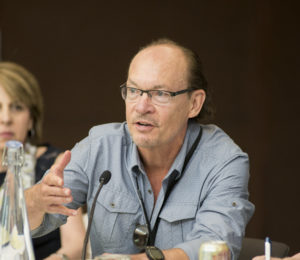 The challenge of fragile states, fragile context, is the development, and in some sense, the national security challenge of our times….Somehow simultaneously we’ve got to address grievance, governance, and growth in fragile states.”
The challenge of fragile states, fragile context, is the development, and in some sense, the national security challenge of our times….Somehow simultaneously we’ve got to address grievance, governance, and growth in fragile states.”
Nancy Lindborg, president, United States Institute of Peace; former assistant administrator of USAID, and former president of Mercy Corps. Founded in 1984, the Institute is active in Afghanistan, Iraq, Nigeria and other countries across the Middle East and Africa, with the mission to prevent or resolve armed conflicts.
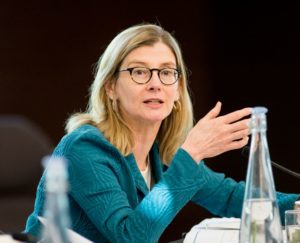 “We’re seeing a high correlation between fragile states and incidents of violent extremism….So the conversation of values versus security is a false dichotomy—in addressing fragility, we both uphold our values and improve national security.”
“We’re seeing a high correlation between fragile states and incidents of violent extremism….So the conversation of values versus security is a false dichotomy—in addressing fragility, we both uphold our values and improve national security.”
Michelle Nunn, CEO, CARE USA; former CEO of Points of Light, the world’s largest organization dedicated to volunteer service. CARE International reached more than 80 million people, with priorities in programs for women and girls, including Middle East conflict areas, in 2016.
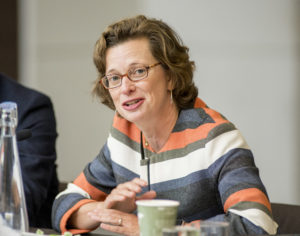 “For CARE, we believe that there are at least three focus areas in terms of approaches in fragile states. One is we have to focus on women and girls. Two is we have to focus on resiliency. And three is we have to focus on inclusive governance.”
“For CARE, we believe that there are at least three focus areas in terms of approaches in fragile states. One is we have to focus on women and girls. Two is we have to focus on resiliency. And three is we have to focus on inclusive governance.”
Janet Napolitano, president, University of California; former U.S. secretary of Homeland Security, and former governor of Arizona. Each of the ten campuses of the University of California, the world’s largest public institution of higher learning, is home to a multidisciplinary Blum Center for Developing Economies focused on reducing poverty and income inequality.
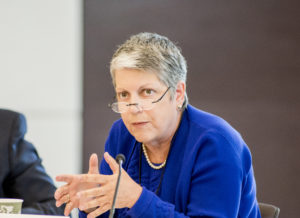 “You could make an argument that assistance directed to institution building in failed states such as Yemen or Somalia would have a direct impact on terrorists, terrorist recruitment, and prevention of more American military intervention in those areas.”
“You could make an argument that assistance directed to institution building in failed states such as Yemen or Somalia would have a direct impact on terrorists, terrorist recruitment, and prevention of more American military intervention in those areas.”
Don Kerrick, managing director, Kerrick Consulting; retired U.S. Army three-star general, former vice president of General Dynamics Advanced Information systems and former White House deputy national security advisor. He was a principal U.S. negotiator in crafting the peace agreement that ended the three-year Balkan War in 1995.
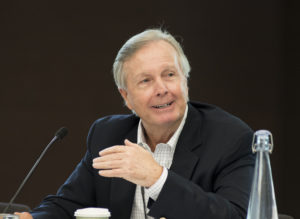 “We can’t win the war on the battlefield if we do not have all elements of soft power there, adding to what the military has accomplished. And certainly, we cannot sustain the peace if we do not continue to invest with what the military has done.”
“We can’t win the war on the battlefield if we do not have all elements of soft power there, adding to what the military has accomplished. And certainly, we cannot sustain the peace if we do not continue to invest with what the military has done.”
John Hardman MD, retired in 2014 as president and CEO of The Carter Center after more than 20 years in that role. A physician and child psychiatrist, he is a member of the internal advisory committee of Emory Global Health Institute. The Carter Center has worked to prevent or end wars, improve health and promote democracy in poor nations for 35 years.
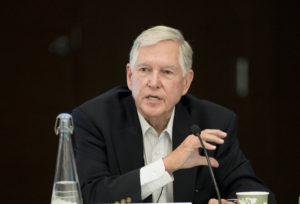 “Developing relationships with individuals in the country as well as country leadership and ministers to work on their agenda is critical. Being able to put them in leadership roles is the second priority.
“Developing relationships with individuals in the country as well as country leadership and ministers to work on their agenda is critical. Being able to put them in leadership roles is the second priority.
The third priority would be working with them, sharing knowledge and information so that they are successful in the process. And the fourth would be giving them the credit for the results that are achieved.”
** **
Top photo courtesy of Mercy Corps
Inset photo credits: Alex Irvin, Brookings Institution


Leave a Reply